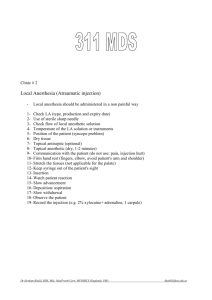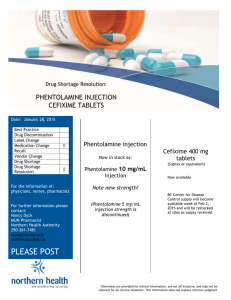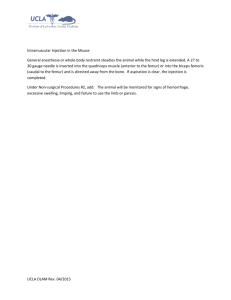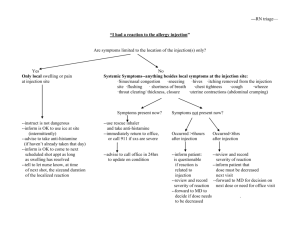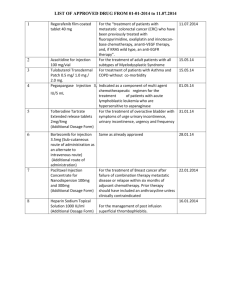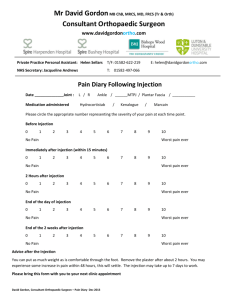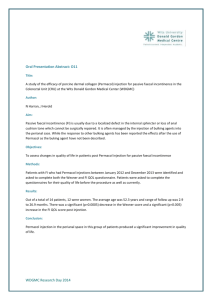Chapter 8 - Malignant Disease
advertisement
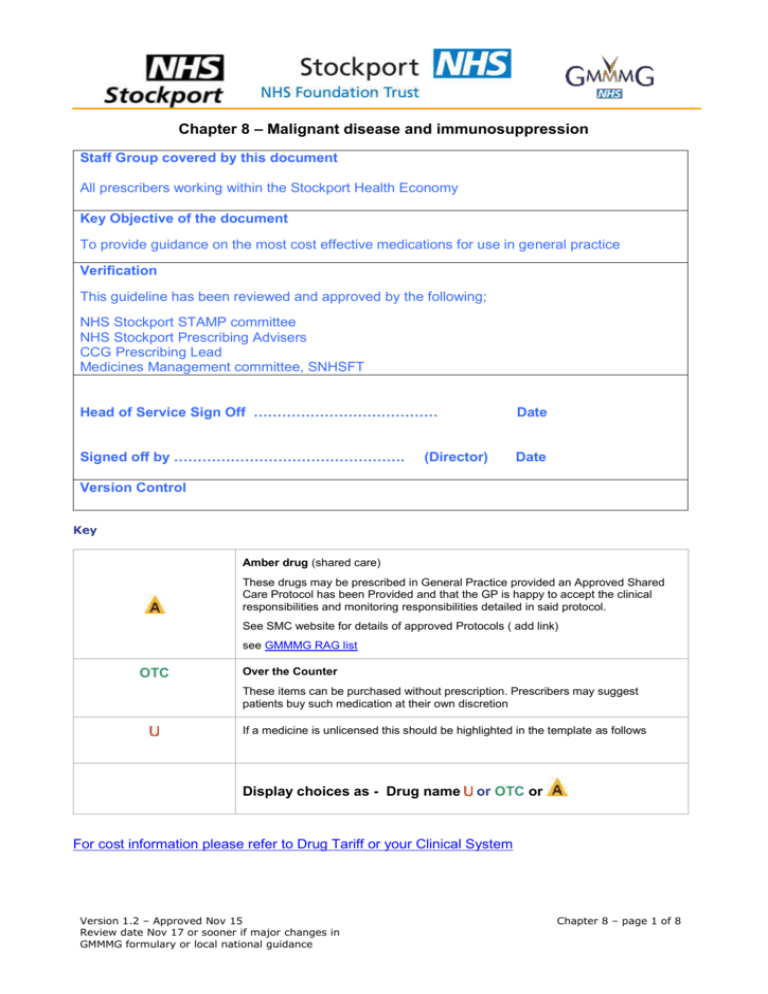
Chapter 8 – Malignant disease and immunosuppression Staff Group covered by this document All prescribers working within the Stockport Health Economy Key Objective of the document To provide guidance on the most cost effective medications for use in general practice Verification This guideline has been reviewed and approved by the following; NHS Stockport STAMP committee NHS Stockport Prescribing Advisers CCG Prescribing Lead Medicines Management committee, SNHSFT Head of Service Sign Off ………………………………… Date Signed off by …………………………………………. Date (Director) Version Control Key Amber drug (shared care) These drugs may be prescribed in General Practice provided an Approved Shared Care Protocol has been Provided and that the GP is happy to accept the clinical responsibilities and monitoring responsibilities detailed in said protocol. See SMC website for details of approved Protocols ( add link) see GMMMG RAG list OTC Over the Counter These items can be purchased without prescription. Prescribers may suggest patients buy such medication at their own discretion If a medicine is unlicensed this should be highlighted in the template as follows Display choices as - Drug name or OTC or For cost information please refer to Drug Tariff or your Clinical System Version 1.2 – Approved Nov 15 Review date Nov 17 or sooner if major changes in GMMMG formulary or local national guidance Chapter 8 – page 1 of 8 BNF Chapter 8 Malignant disease and immunosuppression Subsections are intentionally omitted where there is no formulary drug choice Section 8.1 Cytotoxic Drugs 8.1.1 - 8.1.5 The chemotherapy of cancer is complex and should be confined to specialists in oncology and haematology. NPSA anti-cancer drug recommendations Alkylating Drugs Anthracyclines Antimetabolites Vinca alkaloids Antineoplastic drugs NOTE: a number of cytotoxic medicines that are used for indications other than cancer are listed elsewhere in this formulary under the relevant chapter e.g. methotrexate for rheumatological indications in chapter 10. Only trained pharmacy personnel should reconstitute cytotoxics and prescription validation should only be carried out by suitably trained pharmacists. Pharmacy Guidelines for the safe use of oral anti-cancer medicines are available on the GMMMG website. The GMCCN policy and procedure for chemotherapy administration provides further information. All cytotoxics with a positive NICE Health Technology Appraisal are approved for use in Greater Manchester. NHS England's Cancer Drug Fund provides a further list of approved uses of cytotoxic drugs and the latest national funding policies. Treatment for cytotoxic-induced side effects (Hospital only-with chemotherapy regime) Mucositis and myelosuppression Calcium Folinate Tablets 15mg Folinic acid (as calcium salt) Solution for injection 100mg/2ml, 400mg/8ml and 900mg/18ml Urothelial toxicity Mesna Tablets: 400mg, 600mg Solution for injection 400mg/4ml, 1g/10ml Additional Notes Link to additional notes document All cytotoxics with a positive NICE Health Technology Appraisal are approved for use in Greater Manchester. NHS England's Cancer Drug Fund provides a further list of approved uses of cytotoxic drugs and the latest national funding policies. www.england.nhs.uk/2014/02/03/cdf-drug-release/ Section 8.2 Drugs affecting the immune response 8.2.1 First choice Antiproliferative immunosuppressants Azathioprine Tablets 25mg, 50mg Version 1.2 – Approved Nov 15 Review date Nov 17 or sooner if major changes in GMMMG formulary or local national guidance see GMMMG RAG list Chapter 8 – page 2 of 8 Alternatives Mycophenolate Mofetil Specialist use only Capsules 250mg, Tablets 500mg Mycophenolic acid (Myfortic ®) Specialist use only Gastro-resistant tablets 180mg, 360mg Additional notes All new patients commenced on mycophenolate mofetil should be commenced on a “branded generic” preparation (Accord). Mycophenolate mofetil and mycophenolic acid are not interchangeable. Patients on Myfortic® must remain on Myfortic®. Subsection: First choice 8.2.2 Ciclosporin Corticosteroids & immunosuppressants Capsules 25mg, 50mg, 100mg RA only Capimmune® brand used. Prescribe by brand for transplantation. Do not switch between brands in this indication. Neoral® used. Alternatives Tacrolimus Capsules 500microgram, 1mg, 2mg, 5mg Granules 200microgram, 1mg Modified Release capsules 500microgram, 1mg, 3mg 5mg MHRA Drug Safety Update Prescribe by brand name only, to minimise the risk of inadvertent switching between products, which has been associated with reports of toxicity and graft rejection Additional notes There are 3 different oral formulations of tacrolimus: • Adoport®, Prograf®, Capexion®, Tacni®, and Vivadex® are immediate-release capsules that are taken twice daily, once in the morning and once in the evening; • Modigraf® granules are used to prepare an immediate-release oral suspension which is taken twice daily, once in the morning and once in the evening; • Advagraf® is a prolonged-release capsule that is taken once daily in the morning. Switching between different oral formulations of tacrolimus requires careful supervision and therapeutic monitoring by an appropriate specialist. Version 1.2 – Approved Nov 15 Review date Nov 17 or sooner if major changes in GMMMG formulary or local national guidance Chapter 8 – page 3 of 8 8.2.3 First choice Antilymphocyte monoclonal antibodies Rituximab Concentrate for IV infusion Subsection: Specialist use only Causes lysis of B lymphocytes Interferon Alfa 8.2.4 Other immunomodulating drugs Interferon alfa-2b (rbe) IntronA® Solution for injection (for subcutaneous injection or intravenous infusion) Solution for injection pen (for SC injection) Interferon alfa-2a (rbe) Roferon-A® Solution for injection pre-filled syringes (for subcutaneous use), Solution for injection cartridges (for Roferon® pen device, subcutaneous and intramuscular use) Solution for injection vials (for subcutaneous and intramuscular use) PegInterferon Alfa Peginterferon alfa-2a (rbe) Pegasys® Solution for injection pre-filled syringe (for subcutaneous injection) Peginterferon alfa-2b (rbe) ViraferonPeg® Powder and solvent for solution for injection pre-filled pen (for subcutaneous injection) Additional notes NICE TA75: peginterferon alfa, interferon alfa, and ribavirin for chronic hepatitis C) Link to additional notes document Interferon Beta Interferon beta–1a Avonex®, Rebif® Solution for injection pre-filled syringe Solution for injection pre-filled pens Version 1.2 – Approved Nov 15 Review date Nov 17 or sooner if major changes in GMMMG formulary or local national guidance Chapter 8 – page 4 of 8 Powder and solvent for solution for injection vials Solution for injection cartridges (for RebiSmart® device) Interferon beta–1b Betaferon® Powder and solvent for solution for injection Additional notes NICE produced guidance NICE TA32 (January 2002) for the use of beta interferon and glatiramer acetate which did not recommend them, because although it states that they work, there remains uncertainty about which patients benefit from these medicines and to what extent. The Department of Health (DH) produced a risk sharing scheme recommending these treatments, and helping ensure that they be made cost effective for the NHS to commission. (DH Health Service Circular HSC 2002/004). These treatments are now covered by NHS England policy Disease Modifying Therapies for Patients with Multiple Sclerosis (Ref: NHSCB/D04/P/a). BCG bladder instillation Connaught strain BCG ImmuCyst® Specialist use only Bladder instillation vials 81mg TICE strain BCG OncoTICE® Specialist use only Bladder instillation vial 12.5mg Additional notes Link to additional notes document Lenolidomide, thalidomide and pomalidomide Thalidomide Capsules 50mg Lenalidomide Capsules 5mg, 10mg, 15mg, 25mg Pomalidomide ▼ Capsules 1mg, 2mg, 3mg, 4mg Additional notes Link to additional notes document NICE TA171: lenalidomide for the treatment of multiple myeloma (June 2009) NICE TA228: bortezomib and thalidomide for the first-line treatment of multiple myeloma (July Version 1.2 – Approved Nov 15 Review date Nov 17 or sooner if major changes in GMMMG formulary or local national guidance Chapter 8 – page 5 of 8 2011) Section 8.3 Sex hormones and hormone antagonists in malignant disease Subsection: Diethylstilbestrol 8.3.1 Oestrogens Tablets 1mg, 5mg Ethinylestradiol (2nd Line) Tablets 10microgram, 50microgram, 1mg Subsection: Medroxyprogesterone acetate 8.3.2 Progestogens Tablets 10mg, 100mg, 200mg Megestrol acetate Tablets 160mg Subsection: Anastrozole 8.3.4 Hormone Tablets 1mg antagonists 8.3.4.1 Breast Cancer following specialist initiation Exemestane following specialist initiation Tablets 25mg Letrozole following specialist initiation Tablets 2.5mg Tamoxifen Tablets 10mg, 20mg Fulvestrant Oily injection 50mg/ml x2 5ml prefilled syringes following specialist initiation Specialist use only – HOSPITAL only drug Additional notes Link to additional notes document Link to additional notes document NICE TA112 Breast cancer (early) - hormonal treatments Version 1.2 – Approved Nov 15 Review date Nov 17 or sooner if major changes in GMMMG formulary or local national guidance Chapter 8 – page 6 of 8 Subsection: Goserelin Zoladex® 8.3.4.2 Gonadorelin Implant pre-filled syringe 3.6mg (four weeks) analogues and gonadotrophinreleasing hormone antagonists following specialist initiation Implant pre-filled syringe 10.8mg (twelve weeks) Triptorelin Decapeptyl® Gonadorelin analogues following specialist initiation Intramuscular injection 3mg (four weeks) 11.25mg (twelve weeks) (for licensed indications) Leuprorelin Prostap® Suspension for injection pre-filled syringe 3.75mg (four weeks) Suspension for injection pre-filled syringe 11.25mg (three months) Anti-androgens Bicalutamide following specialist initiation Tablets 50mg, 150mg Cyproterone acetate Tablets 50mg, 100mg Enzalutamide ▼ Capsules 40mg Abiraterone ▼ Tablets 250mg Gonadotrophinreleasing hormone antagonists Degarelix Powder for solution for injection 80mg, 120mg IPNTS recommendation: degarelix Only to be used in the patient group defined in the IPNTS recommendation. Additional notes Link to additional notes document 8.3.4.3 Somatostatin analogues First Choice other indications Octreotide Solution for injection (various forms) 50microgram/1ml,100microgram/1ml ,500microgram/1ml, 1mg/5ml Suspension for injection (depot) 10mg, 20mg, 30mg Version 1.2 – Approved Nov 15 Review date Nov 17 or sooner if major changes in GMMMG formulary or local national guidance Chapter 8 – page 7 of 8 Version 1.2 – Approved Nov 15 Review date Nov 17 or sooner if major changes in GMMMG formulary or local national guidance Chapter 8 – page 8 of 8
